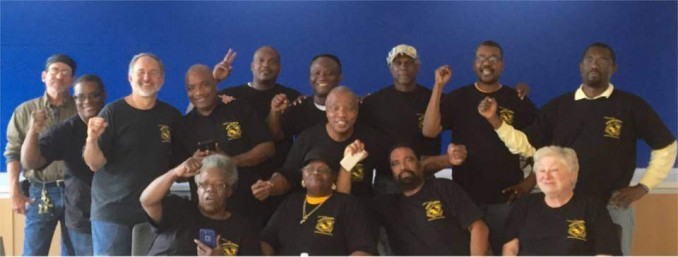Boston union aids Standing Rock, Charlotte resistance
 On Sept. 22, the Boston School Bus Drivers Union, Steelworkers Local 8751 held its first membership meeting since the start of school.
On Sept. 22, the Boston School Bus Drivers Union, Steelworkers Local 8751 held its first membership meeting since the start of school.
This writer had the rare opportunity to witness the union’s 40-plus-year tradition of solidarity in action. While in Boston, I was asked to give the membership an update on the case of Michigan political prisoner Rev. Edward Pinkney.
Last November Local 8751 passed a resolution demanding Pinkney’s freedom. Rev. Pinkney in turn sent a letter of support to the four fired Bus Drivers Union leaders, who later won their 26-month battle and were reinstated by the union-hating Veolia/Transdev corporation. At their recent meeting, the bus drivers listened attentively and voted unanimously to donate to Pinkney’s defense.
This was only one of nine solidarity actions taken at just one meeting.
The members and leadership gave recognition to the vanguard role being played by the Indigenous communities at Standing Rock and the Black and Brown youth of Charlotte, N.C., in resisting racism and capitalism. Motions to contribute funds to the Red Warrior Camp and the bail fund for youth arrested in Charlotte passed unanimously, with the latter drawing a friendly amendment to increase the amount originally proposed.
The Standing Rock resolution read in part:
“Whereas the Standing Rock Sioux are in a life-and-death struggle to block construction of the Dakota Access Pipeline in North Dakota, a struggle of the most vital import to environmental justice and the very survival of the planet.
“Whereas unfortunately and regrettably at the height of this battle, the AFL-CIO issued a statement attacking Standing Rock defenders and defending DAPL using the company line that it provides ‘family-supporting jobs’ and ‘makes the U.S. more competitive.’
“Be it therefore resolved that the Boston School Bus Drivers Union, USW Local 8751, pledges our wholehearted solidarity to the resistance at Standing Rock. …
“Be it further resolved that Local 8751 will forward this resolution to President Trumka, urging that the AFL-CIO pledge full labor solidarity to this just struggle and pledge the vast human and material resources of the AFL-CIO towards assisting the occupation at Standing Rock.”
What solidarity looks like
The membership also voted to support a campaign by teachers’ unions against Question 2, a ballot measure to impose more privatization on Boston’s public schools through budget transfers to expanded charter schools; to support a local demonstration against police brutality and in solidarity with Charlotte and Tulsa, Okla.; to assist the U.S. delegation to the 17th Congress of the World Federation of Trade Unions; to support the Sept. 30 Day of Action for Haitian Workers; to support changing “Columbus Day” to Indigenous Peoples Day and “Thanksgiving” to the annual National Day of Mourning; and passed resolutions of solidarity with Mexican teachers’ unions and with Puerto Rican unions fighting austerity.
This local of less than a thousand members, 98 percent workers of color and primarily Haitian, committed significant resources to assist oppressed workers in other states and other countries.
This meeting was not exceptional in that regard. Anti-racist and anti-imperialist solidarity is what defines Local 8751, from the days its founders began driving Black schoolchildren through crowds of brick-hurling racists in the early 1970s to its current daily battles with the monster multinational corporation Veolia/Transdev. The union covered its workplace battles in depth, bringing the rank and file up to date on the massive grievance backlog, new charges with the National Labor Relations Board and in federal court, and routing and payroll problems created by Transdev’s misuse of GPS technology to speed up work.
This kind of class struggle unionism, fostered by the revolutionary Team Solidarity leadership of Local 8751, is what sorely needs to be revived across the labor movement in this country.

